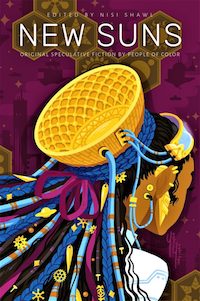Though New Suns is simply presented as an anthology of short fiction by people of colour, without any over arching theme, a great many of the stories in the collection focus on what it means to be the other—or become the other. But of course they do. This comes as no surprise, though some readers may be slightly disappointed when many of the stories don’t quite push at this enough, holding back just that little bit that stops from deeper exploration of their narrative.
For some, it is that the short story format isn’t quite long enough to explore what they’re thinking (and so some of the stories come across as excerpts, which isn’t necessarily a negative aspect). For some it’s just a matter of undeveloped skill at addressing heavier, more complicated themes in equally complicated settings. Regardless, New Suns is an earnest compilation of voices from many ethnicities and backgrounds, making it a nice little package for those looking to read the narratives of writers exploring their experiences as people of colour, and as marginalised people .
The idea of being the other, or experiencing the other, or even othering the other (as it were) may not have been declared an existing theme in New Suns, but is hard to escape, as just as ideas about imperialism can not be escaped. The anthology begins with a quick, fun story by Tobias S. Buckell, “Galactic Tourist Industrial Complex,” in which Earth is a (bit of a cheap and crappy) tourist destination for beings from all over the universe, who travel there looking to consume human culture. One such being dies in a tourist jaunt in a New York City taxi, and the cab driver in whose car this being falls from must contend with what this means for the species. It’s one New York minute that may change the thinking and future of an entire alien race.
On a more introspective and deeply emotional note, Silvia Moreno-Garcia’s “Give Me Your Black Wings Oh Sister” is a lovely, sad, frightening piece of writing, about a young woman’s ghosts; ‘some ghosts are woven into walls and others are woven into skin with an unbreakable, invisible thread.’ Moreno-Garcia’s writing is (as always) poetic and evocative and a joy to read, as she explores a young woman’s darkest demons and memories of her baby brother, and ‘a love that keeps secrets’ of the other within her skin.
“Harvest” by Rebecca Roanhorse is another genuinely moving, melancholic and lonely story about the the longterm impact of Europe’s colonisation of Native Americans, with the protagonist herself a Native woman, falling for a ‘deer woman…wild and without reason’. But this deer woman does have reason to ask for what she does, and her lover can not refuse. Is it love that makes her act this way? Or is that her lover has no soul, that her eyes are ‘mirrors’, showing the protagonist only what her own heart desires?
Equally well written is Indrapramit Das’ “The Shadow We Cast Through Time,” a complex, lushly told story of a colonised planet that has lost all contact with ‘Farhome’ and it’s population that must now survive independently, learning to deal with their own planetary ‘demons’, and how these creatures may not be so different from them after all. Das’ language is beautiful, and the world building intriguing; the short story format just barely enough to contain what he wants to achieve here.
Vastly different but much needed in this anthology is the surge of dark humour in Steve Barnes’ “Come Home to Atropos,” which is presented as the script of an infomercial for a Caribbean island known to be a tourist destination for those desiring assisted suicide. The island of Atropos, we slowly realise, is poverty struck and desperate for this tourism from the west. This is revealed quite slyly in the narrative, as the infomercial attempts to convince potential tourists that Atropos really is similar to the heaven they’re hoping to get to. ‘Do not be alarmed’, says the narrator, ‘by the lack of water and power…our people are resourceful, and although your leaders felt it would be best for us to rely upon our own resources, our people feel only welcoming toward you’. The politics of global economy and those who control it come into play, too, with passing mention of ‘closed factories due to American embargoes and power outages’. It’s terrible to laugh at some of the things Barnes writes, and perhaps only someone from a colonised background would find some of what he writes amusing. For example, a note in the infomercial script to the art department that reads, ‘we need a variety of images of the beautiful people of Atropos, and the hospitality they provide. Certainly we can find some who don’t look hungry? And no amputees, please’. It’s caustic satire, of course, but with great pitch.
Some of the stories that fall just that little bit shorter still maintain interest. Hiromi Goto’s “One Easy Trick,” an odd little story about a woman’s belly fat falling off and running away, is just that—odd. It could’ve been more of something, but it wasn’t. “Dumb House,” by Andrea Hairston, about a couple of sales people trying to convince a woman who makes tech to upgrade her house to a ‘smart’ model also feels like it could be something more, yet it isn’t.
Buy the Book


New Suns: Original Speculative Fiction by People of Color
A deal with a djinn is challenged in “The Fine Print” by Chinelo Onwualu, a new take on the old be careful what you wish for adage, with a little postcolonial slant in there, when we are told that the djinn who only demands a child now and then, having saved the town from it’s abusive ‘masters’. Anil Menon’s “The Robots of Eden” is another story that falls just a tiny bit short of being truly moving, as clever as it is in premise. Set in a near posthuman future Mumbai, it explores what may happen to human emotion once people are ‘enhanced’. If all our emotions are curated safely to make sure we are never truly bothered by anything, are we superior to those who are controlled instead by their emotions? Which of us is more human?
Standard reviews of short fiction anthologies will tell you that there is a story here for everyone, and that not everyone will appreciate each story. This is a cliche, and like most cliche’s, it’s true. It pretty much applies to every anthology, and hardly bears repeating. Still, any effort in collecting or commissioning original stories by writers of colour must be applauded and appreciated regardless, though one hopes that writers of colour are featured more often in anthologies in general, so that even those who are not purposefully searching them out will experience their work. No one should have to look hard to hear these voices, or any that aren’t able to shout.
New Suns: Original Speculative Fiction by People of Color is available from Solaris.
Mahvesh loves dystopian fiction & appropriately lives in Karachi, Pakistan. She writes about stories & interviews writers for the Tor.com podcast Midnight in Karachi when not wasting much too much time on Twitter.










